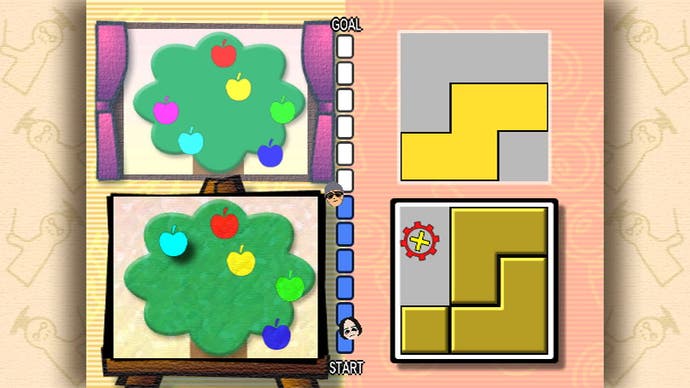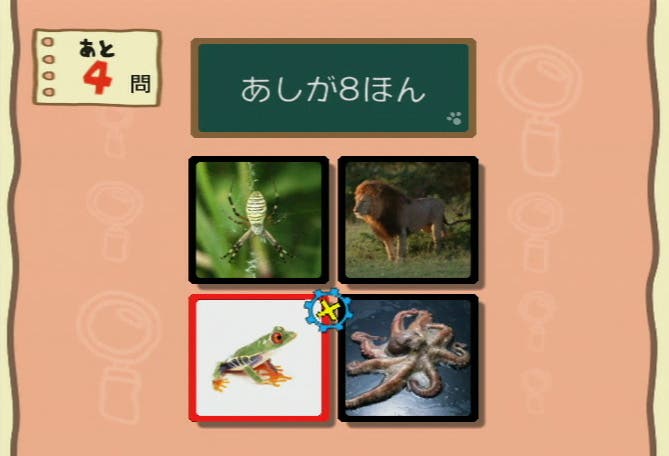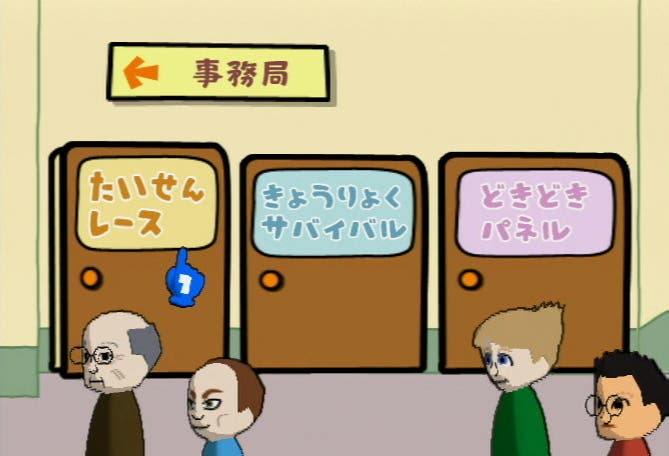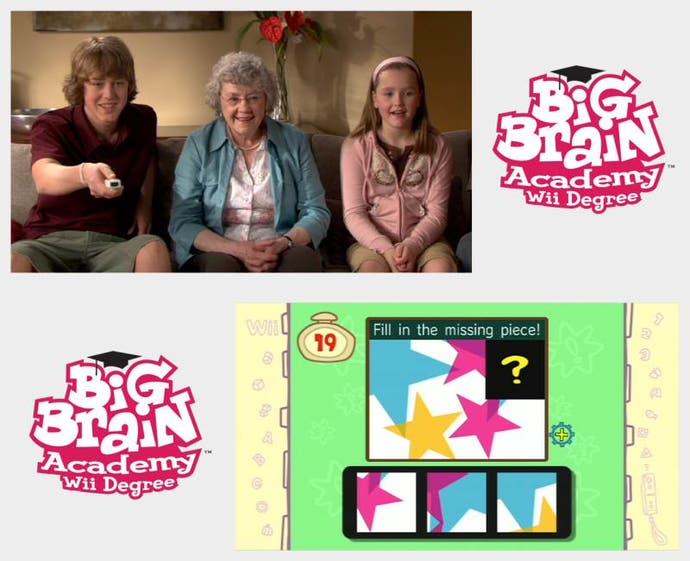Big Brain Academy: Wii Degree
Wouldn't graduate with a third from a polytechnic.
Big Brain Academy: Wii Degree is a difficult sort of title for a video game reviewer to approach. Okay, sure, it has many of the trappings of a traditional video game; medals for playing well, a multiplayer mode, it comes in a box on a disc that you put into a console, that sort of thing. But as part of Nintendo's "Touch Generations" line-up, it's probably as uncomfortable with me using the term "game" to describe it as I am. The difference is, of course, is that Big Brain Academy: Wii Degree probably thinks of itself as "lifestyle software," I think of it as the digital equivalent of a dog-eared primary school maths book.
Now, that might sound like an overly harsh appraisal, but look at it this way. You could probably have just as much fun with a maths or a basic IQ test book. The tasks are roughly as hard, you can give yourself especially big ticks when you get questions right and you can even "go multiplayer" by seeing who can answer a page of questions fastest and get the most answers right. What's so different, really?
You see, Big Brain Academy: Wii Degree, a sequel of sorts to Big Brain Academy for Nintendo DS (which we gave a reservedly above-average review last year) joins its predecessor by lacking many of the crucial hooks that made Brain Age: Train Your Brain in Minutes a Day! such a resounding success and so distinctly different from your average school test.

The first big problem with Big Brain Academy: Wii Degree, and arguably the most important, is that there is a lack of a meaningful goal. Whereas Brain Age gave you a nice obvious target to shoot for (a brain that's so sprightly and youthful it could be mistaken for a 20 year-old's) The Big Brain Academy titles ask you to "raise your brain's weight." Patently a load of old nonsense.
I can imagine, after weeks of working on my Brain Age, my synapses and neurons being so synappy and neuronic that they look years younger than my decrepit 26 year-old noggin's should. What I can't imagine is that I'm suddenly lugging around over three kilograms of brain when just last week it weighed a third of that.
But it's not just the message, but the delivery. While Brain Training had only nine games to play, most were a rounded challenge that you could spend quite a while mastering. In contrast, Big Brain Academy: Wii Degree, like its Nintendo DS sibling, offers fifteen simplistic mini-games in five categories: Identify, Memorise, Analyse, Compute and Visualise. When taking a test, you're expected to complete the three games in each category numerous times in a random order of difficulty.
Due to the speed in which you're expected to complete the games, it actually feels a bit like a Wario Ware title; albeit one with a limited range of games and a genuine lack of character.

While oddball Professor Kawashima managed to make the concept of lowering your brain age a short, fun, daily activity, the nameless jelly bean tutor of Big Brain Academy: Wii Degree has almost nothing to say for himself, and pays no attention to the player's daily performance as the game lacks any calendar function.
The fifteen games on offer are all new, but they're not distinct or individually interesting enough to make the title particularly valuable if you've already got the Nintendo DS title. Indeed, the title falls into all of the same traps that the original did. You can rush through the practice mode and get gold medals on each game within a couple of hours. You can test your brain's weight as many times as you like. There are no interesting comparison graphs or ways to observe yours (or a friend's) progress.
Once you've maxed out your brain's weight, there's simply no reason to keep playing. We tried, we really did, but to be honest, we gave up on trying to play the game in small, daily chunks as we just got bored of walking all the way over to our TV to swap the disc in if we were busy playing something else, a problem we couldn't have with the Nintendo DS title, living, as it does, snugly in a case with our Nintendo DS.

The things which are supposed to really differ the title from its Nintendo DS predecessor also fall somewhat short of the mark. While (yes!) your Miis are used in game, they add nothing of substance, only cluttering the halls of the "Academy" and adorning the cover of your student records.
The new multiplayer section, too, adds little. With only three different multiplayer games on offer and only one, Mind Sprint, offering simultaneous play (for only two players at a time) it's at best a momentary distraction.
The title does use the Wii's WiiConnect24 functionality in an interesting way. Much like the Mii channel, which allows you to set your Miis to roam to your friend's systems, you can set your student records to be painlessly transferred to any of your friends who happen to own Big Brain Academy: Wii Degree. The most excellent thing of all? You don't need to enter a second friend code to do it.

Of course, there isn't a huge amount of reason to share your student records, but you can at least use traded student records play against an A.I. version of your friends in Mind Sprint. The closest comparison I can think of is (surprisingly) Virtua Fighter's system of A.I. opponents, but (unsurprisingly) the battles you'll have in Mind Sprint don't have any of a Virtua Fighter title's depth.
This lack of depth is endemic in Big Brain Academy: Wii Degree. We'll only agree with it that it's a piece of "lifestyle software" if that term specifically means something utterly forgettable that's over and done with in a few hours.
At best, this might have been a cute piece of original downloadable content on a system that sorely needs some. As a full price piece of software, it's genuinely worth less than forty quid's worth of dog-eared primary school maths books.

